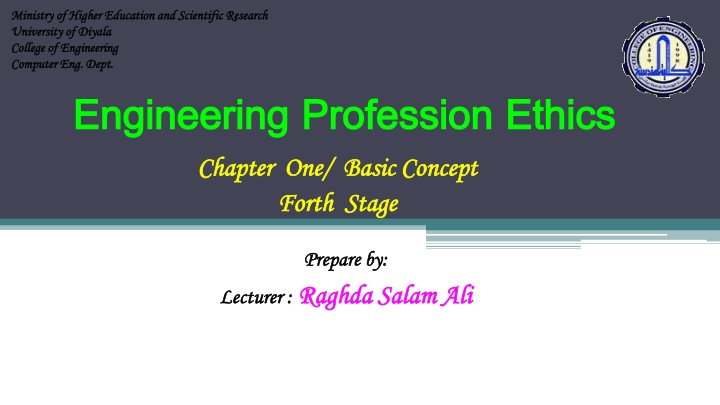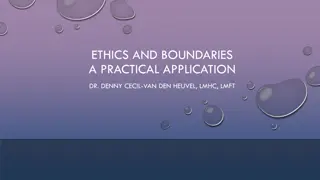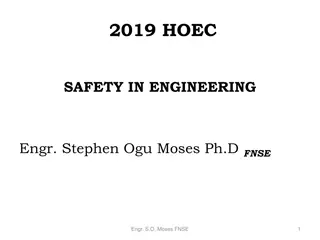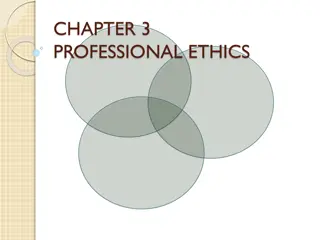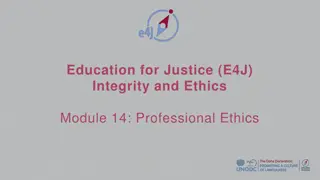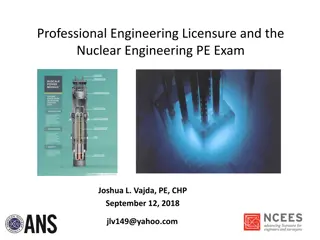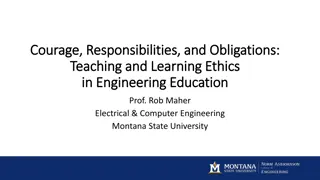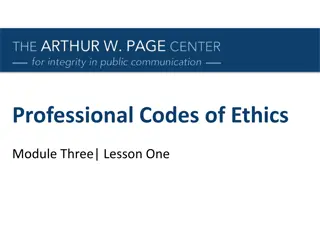Engineering Ethics and Professional Standards
Engineering ethics and professional standards are essential components for individuals and organizations, guiding behavior and decision-making based on moral values and principles. Ethics refer to moral standards of right and wrong, shaping conduct and defining responsibilities towards society. Professional ethics encompass codes of conduct specific to a particular profession, ensuring competency, knowledge, and adherence to ethical standards. Understanding ethics is crucial for maintaining integrity and upholding societal values in the engineering profession.
Download Presentation

Please find below an Image/Link to download the presentation.
The content on the website is provided AS IS for your information and personal use only. It may not be sold, licensed, or shared on other websites without obtaining consent from the author.If you encounter any issues during the download, it is possible that the publisher has removed the file from their server.
You are allowed to download the files provided on this website for personal or commercial use, subject to the condition that they are used lawfully. All files are the property of their respective owners.
The content on the website is provided AS IS for your information and personal use only. It may not be sold, licensed, or shared on other websites without obtaining consent from the author.
E N D
Presentation Transcript
Ministry of Higher Education and Scientific Research Ministry of Higher Education and Scientific Research University of Diyala University of Diyala College of Engineering College of Engineering Computer Eng. Computer Eng. Dept. Dept. Engineering Profession Ethics Engineering Profession Ethics Chapter One/ Basic Concept Chapter One/ Basic Concept Forth Stage Forth Stage Prepare by: Prepare by: Raghda Salam Ali Salam Ali Lecturer : Lecturer : Raghda
Ethics Refers to well based standards of right and wrong that prescribe what humans ought to do, usually in terms of rights, obligations, benefits to society, fairness, or specific virtues. Ethics a set of moral values and principles which form the standards of the code of conduct of individuals, organizations and professions. It is the principles of good and bad behavior governing what is right and wrong conduct.
Before we studying "Ethics is knowing the difference between what you have a right to do and what is right to do." Potter Stewart "Ethics are more important than laws." Wynton Marsalis "Educating the mind without educating the heart is no education at all." Aristotle "Education without values, as useful as it is, seems rather to make man a more clever devil." C.S. Lewis
Ethics (noun) The definition of ethic as noun The study of moral standards and how they affect conduct (singular) A system of moral principles governing the appropriate conduct for an individual or group (plural)
PROFESSION PROFESSION The term professional refers to anyone who earns their living from performing an activity that requires a certain level of education, skill, or training. There is typically a required standard of competency, knowledge or education that must be demonstrated (often in the form of an exam or credential), as well as adhering to codes of conduct and ethical standards.
Standards of Proper Conduct Professional Ethics: the set of standards adopted by professionals to govern their particular profession, known as the code of ethics for that profession* Personal Values (Ethics): the set of one s own ethical commitments, usually developed religious, or social training. in early home, Common Morality: the set of moral ideals shared by most members of a culture or Society
Engineering Ethics Engineering Ethics is based on Preventative Ethics which is based on two dimensions: 1- Think ahead and anticipate possible consequences of professional actions. 2- Think effectively about consequences and decide what is the ethically correct manner to handle the situation
Concepts of Engineering Ethics 1. Ethical engineering decisions. 2. The professional obligations of engineers go beyond fulfilling a contract with a client or customer. 3. Codes of ethics can provide guidance in the decision-making process Ethical obligations do not stop at any country s border; they are global. considerations are an integral part of making
Engineering Codes of Ethics Accreditation Board for Engineering and Technology (ABET) National Society of Professional Engineers (NSPE) Institute of Electrical and Electronic Engineers (IEEE) American Society of Mechanical Engineers (ASME) American Society of Civil Engineers (ASCE)
You can ask yourself (when making any decisions)
